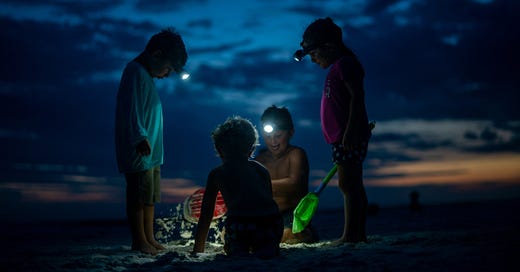“Toi, tu peux être mère d’une grande famille.”
The wizened woman pronounced these words at the end of our planning meeting as I gathered my papers strewn across the table.
You could be the mother of a big family.
I looked at her quizzically, wondering if I’d misunderstood—an hourly occurrence of living in another culture and speaking a foreign language.
She was a no-nonsense volunteer at the women’s shelter in Compiègne where I worked with refugees from North Africa. I was intimidated by her (as I was by many French women, truth be told). Her brisk, all-business manner commanded respect; her booming voice filled the room.
I fumbled to reply, wanting to ask her what she meant. How could leading a meeting make someone think I would be a good mother-of-many? Did she have children herself, or did she catch something in me that I couldn’t yet see, still years away from my own motherhood?
But we were interrupted by one of the children, a shelter resident who wanted to know when her maman would be home so they could have their snack. Soon we were both pulled back into the hubbub of the shelter’s afternoon activities.
My questions were left behind unanswered.
Later that evening I walked home in the dark, turning over the stranger’s strange words. I wasn’t sure I’d ever want to be a mother of a big family. (I had bigger plans, after all.)
What on earth had she meant? I tucked it away in my mental folder of Things I Don’t Understand From France.
But I never forgot her words.
//
Years later, in the middle of scrubbing the toilet after a failed potty training session, I remembered her declaration—and rolled my eyes.
Another afternoon the memory surfaced as I stood elbow-deep in a sink full of dirty dishes. She must have been crazy, I thought.
Last summer as I hauled dirty laundry down to the washing machine, football jerseys and baseball pants caked with sweat and dirt, I sifted back through dusty mental archives of French grammar.
Maybe I’d misheard her. Maybe I’d missed a “pas” and took as positive what she scorned as negative: you could never be the mother of a big family.
Or perhaps she’d said “a great family” instead of a big one. In French, an adjective can switch meaning when it changes places in a sentence. No way an impatient, easily-exasperated person like me was meant to parent many.
But she said what she said. As I dug up later from an old box in the basement closet, my journal from that year testifies to the truth (with ironic HAHAs scribbled in the margins): “Toi, tu peux être mère d’une grande famille.”
If she’d said it because I was organized back then, she’d laugh to see our family home now.
But if she’d noticed some concern I’d shown for the children in the shelter, or a way I’d supported their mothers, or a longing hint I’d dropped about my boyfriend back in the States, then perhaps she picked up what I couldn’t see.
A willingness to stretch toward others.
//
By 5:00 pm most evenings, I am convinced I have chosen the wrong calling.
Patient people are cut out for this work, not me. Type-A planners should raise children and run households, not type-B dreamers genuinely surprised when people need to eat again, three times a day.
But love trumps logistics in the final equation.
I fall back hard on this truth whenever I fail in a given moment. (Which is often.)
My spouse and I will never have a home mistaken for a museum. We will never write any advice book. But this big bustling crew is learning to love each other in the way of large family life that’s quickly going extinct. At the end of each exhausting day, I’m grateful that God gave me the chance to learn to love like this.
When I was younger, I’d see moms-of-many in church, always looking tired at the end of the pew. But after Mass they were always the ones with a kind smile and a twinkle in their eye for any child who passed. I knew they were safe ones to run to if I fell, or cried, or got lost.
Looking back now, could I have glimpsed in them a hint of possibility I couldn’t see in myself? A capacity to love and give and stretch. A willingness to let life’s demands smooth down rough edges like sandpaper. The humility to embrace a calling the world calls crazy.
We cannot see the full truth of our lives within our own skin. This is why callings need conversation partners. Why vocational discernment is a life-long process for everyone. Why we need to be less certain of our ability to grasp the whole truth—and more willing to listen to the wisdom of others.
Earlier this year, my spiritual director named my own creative calling in a way that seemed so simple in hindsight but felt astonishing in the moment.
Everything you’re wanting to do is about noticing and naming God’s presence, isn’t it?
I walked around dazed for weeks after our conversation, feeling far-flung parts of my life click into place in a brand-new way. She offered me a truth I couldn’t see, like that stranger did in a quick aside twenty years ago.
What a gift when we behold each other, catch a glimpse of clarity, and speak it aloud.
Even when the future sounds far-fetched.
Especially when it lets us imagine what we cannot yet see.
Photo by Ben McLeod on Unsplash.





Your words were true blessings for what’s been another hard week of being stretched by motherhood. Thank you. ❤️
Laura, thank you for these words! Your descriptions of motherhood, and the love that stretches… noticing God’s presence… it’s so beautiful and inspiring to me as a mother.